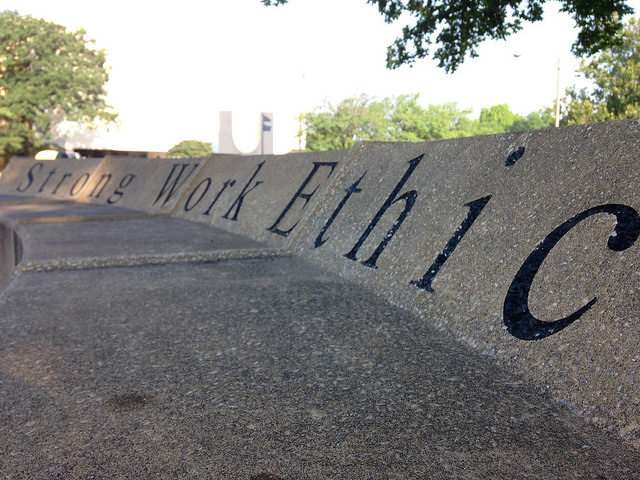A 10-day Business Seminar Field Trip and an Ed Week article got me worked up on the subject of ethics – again! Â I started this blog, set is aside for a while to see if I was just a bit too worked up, but when I reviewed it today, I just had to post it.
In March I took 32 Delphian high school students on a 10-day field trip to Chicago and New York where we met with many top executives in a wide range of companies. Â Because ethics and integrity are two of the four words on our school’s logo, I asked each of them if ethics and integrity played a role in their personal success and in the operation of the businesses they lead. Â Each and everyone launched into a talk about how vital these topics were, and the importance of integrity and ethical behavior in all aspects of the world of business. Â I could go on and on, but we heard many examples from each speaker, and we learned of how integrity and ethical behavior is woven into the cultures of the business we visited. Â
Lance Armstrong and Teaching Students the Meaning of Integrity is the title of an Ed Week commentary that gave me a new perspective on the topic, and I commend it to you. Â One point I took away is is that young people today are confused about the facts when it comes to stories about unethical behavior, and they aren’t getting a clear message about the consequences of unethical behavior.
In discussing Lance Armstrong, the author thinks (as I do) that students are confused.  Armstrong admitted he masterminded “a massive cheating system over a number of years, in which he lied and even sued those who accused him of cheating. Yet kids still don’t know if he has told the whole truth.” Â
The author argues that, “[t]he Lance Armstrong affair symbolizes a sophisticated trend toward achievement that accepts immorality…Similar to the Armstrong affair, kids see their baseball heroes accused of illegal doping, with those who did and didn’t still murky. They see colleges, such as Penn State, choosing to protect reputation above all else”.
This is terrible.  I agree when the author points out that we know that some people on Wall Street, driven by greed, “helped create a recession, but those responsible haven’t yet been held accountable. Polls clearly show lost confidence in politicians, yet the actions of Congress reveal that political party and personal agendas drive government, not the deeper interests of the American people.”
I think that if we don’t set up models of ethical behavior, or stories of integrity in action, students won’t get it. Â People are entitled to their own opinions, but not their own facts. Â Where facts are ambiguous or (appear) unclear, it is difficult to determine if behavior was ethical. Â This is bad – very bad. Â
The author thinks that “[t]he Lance Armstrong affair symbolizes a sophisticated trend toward achievement that accepts immorality…This disturbing trend is undermining the spirit of America. We need to explore its roots so we can begin to weed it out of our society…As a teacher for 61 years, I have seen a steady erosion of the development of character in our schools and homes as we frantically seek a test-proven academic proficiency.”
I share the author’s concern that we have not noticed that the “powerful impact of our neglect of American character development over the past six decades. We assume such problems as drug abuse, alcohol, sexual promiscuity, “cutting,†and school shootings simply reflect a complex new age.”
Not true.  Walter Cronkite used to ask parents to talk to their kids about drugs, asking if they don’t, who will?  I ask you, If parents and teachers don’t talk to students about ethics and integrity, who will?  Imagine the frustration when adults hold up models who later fail us?  You can write your own list of  “stars” (athletes, actors/​​actresses, singers, musicians, etc.) who have either fallen from grace, or already model unethical behavior.  This is bad – very bad!
The author thinks this topic raises concern about the related topics of cheating and bullying, and he raises some very interesting points. Â He cites the Josephson Institute Center for Youth Ethics studies over the years to support his point that a majority of students cheat. Â This is bad. Very very bad. Â
Thinking about education means thinking about whether the author is right when he says “We have become an achievement society, with cheating, lying, and bullying an integral part of American life. Armstrong was a great achiever, and we want to forgive. Outrage at cheating, lying, and bullying may not trump achievement in our society.”
I think outrage is a start, but the plan of action must include teaching our children about ethics and integrity, and imbedding those concepts into the program, and making it part of the fabric and culture of the school itself. Â That’s what we do at Delphian, and it can and must be done everywhere. Â Meanwhile, we must remain outraged whenever we see cheating and lying, and remain committed to making earth a better place to live, each of us in our own way. Â I’m tring my best to do it as an educator and by thinking about education!
Posted by marks on Wednesday June 26, 2013 at 09:29AM
